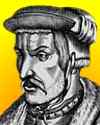 (source)
(source)
|
Heinrich Cornelius Agrippa
(14 Sep 1486 - 18 Feb 1535)
German philosopher and alchemist who wrote the three-volume De Occulta Philosophiae, a defense of mystical “hidden philosophy” encompassing magic, alchemy and astrology. In a later work, De Incertitudine et Vanitate Scientiarum he attacked contemporary scientific theory and practice.
|
Science Quotes by Heinrich Cornelius Agrippa (16 quotes)
[Alchemists] enrich the ears of men with vain words, but empty their Pockets of their Money. Whence it appears to be no Art, but a Composition of Trifles, and inventions of mad brains.
— Heinrich Cornelius Agrippa
In The Vanity of the Arts and Sciences (1530), translation (1676), 313.
[Alchemists] finde out men so covetous of so much happiness, whom they easily perswade that they shall finde greater Riches in Hydargyrie [mercury], than Nature affords in Gold. Such, whom although they have twice or thrice already been deluded, yet they have still a new Device wherewith to deceive um again; there being no greater Madness…. So that the smells of Coles, Sulphur, Dung, Poyson, and Piss, are to them a greater pleasure than the taste of Honey; till their Farms, Goods, and Patrimonies being wasted, and converted into Ashes and Smoak, when they expect the rewards of their Labours, births of Gold, Youth, and Immortality, after all their Time and Expences; at length, old, ragged, famisht, with the continual use of Quicksilver [mercury] paralytick, onely rich in misery, … a laughing-stock to the people: … compell’d to live in the lowest degree of poverty, and … at length compell’d thereto by Penury, they fall to Ill Courses, as Counterfeiting of Money.
— Heinrich Cornelius Agrippa
In The Vanity of the Arts and Sciences (1530), translation (1676), 313.
[Alchemists] get a small livelihood by some Physical Experiments, as also by some Paints and effeminate Fucusses [cosmetics], which the Scriptures call the Oyntments of harlott; whence the Proverb, Every Alchymist is a Physician or a Sope-boyler.
— Heinrich Cornelius Agrippa
In The Vanity of the Arts and Sciences (1530), translation (1676), 312-313.
A Bat meeting any one running away, signifies an evasion: for although she have no wings, yet she flies.
— Heinrich Cornelius Agrippa
In De Occulta Philosophia (1533), Vol. 1. Translation by J.F. (1651) reprinted as The Philosophy of Natural Magic (1913), 169.
Alchymy, or Chymistry, is …
An Art which good men bate, and most men blame,
Which her admirers practice to their shame,
Whose plain Impostures, easie to perceive,
Not onely others, but themselves deceive.
An Art which good men bate, and most men blame,
Which her admirers practice to their shame,
Whose plain Impostures, easie to perceive,
Not onely others, but themselves deceive.
— Heinrich Cornelius Agrippa
In The Vanity of Arts and Sciences (1676), 312.
All these delusions of Divination have their root and foundation from Astrology. For whether the lineaments of the body, countenance, or hand be inspected, whether dream or vision be seen, whether marking of entrails or mad inspiration be consulted, there must be a Celestial Figure first erected, by the means of whole indications, together with the conjectures of Signs and Similitudes, they endeavour to find out the truth of what is desired.
— Heinrich Cornelius Agrippa
In The Vanity of the Arts and Sciences (1530), translation (1676), 108.
Almighty God, to whose efficacious Word all things owe their original, abounding in his own glorious Essence with infinite goodness and fecundity, did in the beginning Create Man after his own likeness, Male and Female, created he them; the true distinction of which Sexes, consists merely in the different site of those parts of the body, wherein Generation necessarily requires a Diversity: for both Male and Female he impartially endued with the same, and altogether indifferent form of Soul, the Woman being possess’d of no less excellent Faculties of Mind, Reason, and Speech, than the Man, and equally with him aspiring to those Regions of Bliss and Glory, where there shall be no exception of Sex.
— Heinrich Cornelius Agrippa
In Female Pre-eminence: Or, The Dignity and Excellency of that Sex above the Male, translation (1670).
Bees are a good omen to Kings, for they signify an obsequious people.
— Heinrich Cornelius Agrippa
In De Occulta Philosophia (1533), Vol. 1. Translation by J.F. (1651) reprinted as The Philosophy of Natural Magic (1913), 169.
But to proceed; as in order and place, so also in matter of her Creation, Woman far excells Man. things receive their value from the matter they are made of, and the excellent skill of their maker: Pots of common clay must not contend with China-dishes, nor pewter utensils vye dignity with those of silver…. Woman was not composed of any inanimate or vile dirt, but of a more refined and purified substance, enlivened and actuated by a Rational Soul, whose operations speak it a beam, or bright ray of Divinity.
— Heinrich Cornelius Agrippa
In Female Pre-eminence: Or, The Dignity and Excellency of that Sex above the Male, translation (1670).
I confess that Magic teacheth many superfluous things, and curious prodigies for ostentation; leave them as empty things, yet be not ignorant of their causes. But those things which are for the profit of men—for the turning away of evil events, for the destroying of sorceries, for the curing of diseases, for the exterminating of phantasms, for the preserving of life, honor, or fortune—may be done without offense to God or injury to religion, because they are, as profitable, so necessary.
— Heinrich Cornelius Agrippa
In De Occulta Philosophia (1533), Vol. 1. Translation by J.F. (1651) reprinted as The Philosophy of Natural Magic (1913), 28.
It is requisite that we should here say something of Magick, which is so linked to Astrology, as being her near Kinswoman, that whoever professes Magick without Astrology, does nothing, but is altogether out of the way.
— Heinrich Cornelius Agrippa
In The Vanity of the Arts and Sciences (1530), translation (1676), 109.
Magic is a faculty of wonderful virtue, full of most high mysteries, containing the most profound contemplation of most secret things, together with the nature, power, quality, substance and virtues thereof, as also the knowledge of whole Nature, and it doth instruct us concerning the differing and agreement of things amongst themselves, whence it produceth its wonderful effects, by uniting the virtues of things through the application of them one to the other.
— Heinrich Cornelius Agrippa
In De Occulta Philosophia (1533), Vol. 1. Translation by J.F. (1651) reprinted as The Philosophy of Natural Magic (1913), 38-39.
Natural Magick is taken to be nothing else, but the chief power of all the natural Sciences; which therefore they call the top and perfection of Natural Philosophy, and which is indeed the active part of the same; which by the assistance of natural forces and faculties, through their mutual & opportune application, performs those things that are above Humane Reason.
— Heinrich Cornelius Agrippa
In The Vanity of the Arts and Sciences (1530), translation (1676), 110.
Natural Magick therefore is that, which considering well the strength and force of Natural and Celestial beings, and with great curiosity labouring to discover their affections, produces into open Act the hidden and concealed powers of Nature.
— Heinrich Cornelius Agrippa
In The Vanity of the Arts and Sciences (1530), translation (1676), 111.
Only for you, children of doctrine and learning, have we written this work. Examine this book, ponder the meaning we have dispersed in various places and gathered again; what we have concealed in one place we have disclosed in another, that it may be understood by your wisdom.
— Heinrich Cornelius Agrippa
In De Occulta Philosophia (1531), Vol. 3, 65. As quoted and cited in epigraph, Umberto Eco and William Weaver (trans.), Foucault’s Pendulum (2007), Front matter before title page.
So requisite is the use of Astrology to the Arts of Divination, as it were the Key that opens the door of all their Mysteries.
— Heinrich Cornelius Agrippa
In The Vanity of Arts and Sciences (1676), 109.

 In science it often happens that scientists say, 'You know that's a really good argument; my position is mistaken,' and then they would actually change their minds and you never hear that old view from them again. They really do it. It doesn't happen as often as it should, because scientists are human and change is sometimes painful. But it happens every day. I cannot recall the last time something like that happened in politics or religion.
(1987) --
In science it often happens that scientists say, 'You know that's a really good argument; my position is mistaken,' and then they would actually change their minds and you never hear that old view from them again. They really do it. It doesn't happen as often as it should, because scientists are human and change is sometimes painful. But it happens every day. I cannot recall the last time something like that happened in politics or religion.
(1987) -- 


